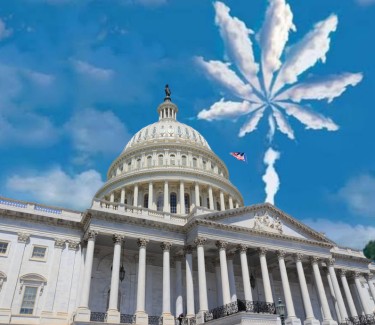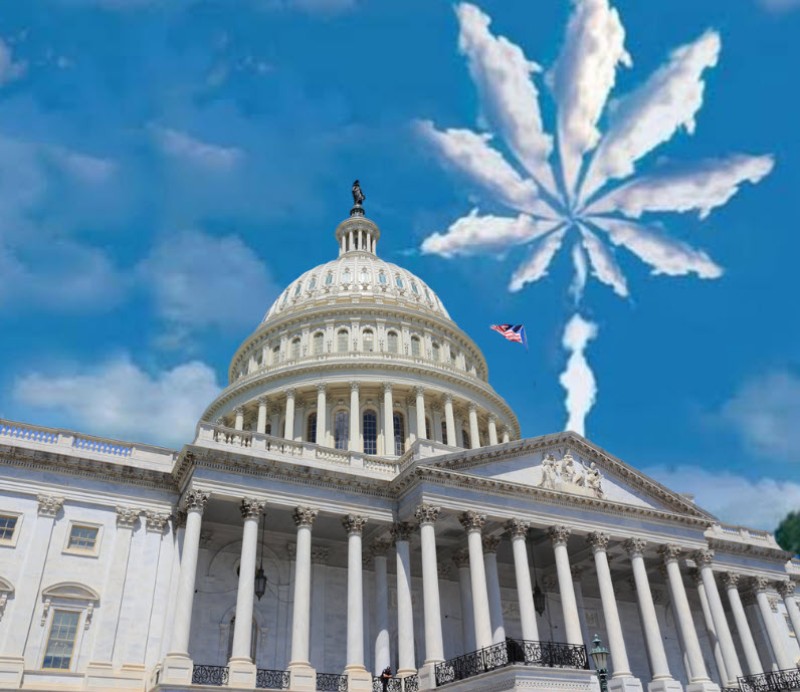
Why Congress Should Bypass the DEA and Legalize Cannabis Directly
For decades, cannabis advocates have been playing a rigged game. We've been asking the Drug Enforcement Administration - an agency whose very existence depends on maintaining the war on drugs - to voluntarily reduce its own power and influence by rescheduling marijuana. It's like asking a tobacco company to regulate smoking or expecting oil executives to champion renewable energy. The incentives simply aren't aligned.
The recent Congressional Research Service report makes something crystal clear that I've been arguing for years: Congress has the power to end cannabis prohibition directly, with "greater speed and flexibility" than the bureaucratic maze we're currently trapped in. While the Biden administration's rescheduling effort has stalled for over a year, and now sits in limbo under the Trump administration, lawmakers could cut through this red tape tomorrow if they had the political will.
Think about it - we're asking the DEA, an agency that has built its entire identity around cannabis being dangerous, to suddenly admit they were wrong all along. We're expecting an organization that has spent billions of taxpayer dollars enforcing prohibition to voluntarily shrink its budget and mission. It's not just unlikely; it's fundamentally illogical.
The DEA's track record speaks for itself. From Derek Maltz calling cannabis a "gateway drug" to Terrance Cole linking marijuana use to youth suicide, the agency continues to perpetuate debunked talking points that would make Reefer Madness producers blush. These aren't the people we should trust to make rational, science-based decisions about cannabis policy. They're the problem, not the solution.
Congress created this mess when they passed the Controlled Substances Act in 1970, criminalizing a plant that had been used safely for thousands of years. It's time for Congress to clean up their own house and finish what they started - not by doubling down on prohibition, but by ending it entirely.
The DEA: A Wolf Guarding the Henhouse
Let's be brutally honest about what we're dealing with here. The Drug Enforcement Administration isn't some neutral scientific body carefully weighing evidence about cannabis safety and efficacy. It's a law enforcement agency whose budget, personnel, and institutional prestige are directly tied to maintaining drug prohibition. Asking the DEA to reschedule cannabis is like asking a prison warden to advocate for criminal justice reform - their incentives are fundamentally misaligned with the outcome we're seeking.
Consider the current state of the rescheduling process. After President Biden initiated the review in 2022, it took Health and Human Services a full 11 months just to complete their initial assessment. Then the DEA began their own separate review, followed by months of additional delays in the administrative hearing process. We're now approaching the three-year mark with no resolution in sight, and the process has been inherited by an administration that's openly hostile to cannabis reform.
This glacial pace isn't accidental - it's institutional resistance. The DEA knows that moving cannabis to Schedule III won't satisfy reformers who want full legalization, but it also threatens their enforcement priorities and budgetary justifications. So they're content to let the process drag on indefinitely, hoping political winds will shift in their favor.
The agency's recent leadership choices tell you everything you need to know about their true intentions. Derek Maltz, who served as acting administrator, has repeatedly called cannabis a "gateway drug" despite mountains of evidence to the contrary. Terrance Cole, the nominee for permanent administrator, has linked marijuana use to youth suicide and expressed vague commitments to "give the matter careful consideration" without any timeline or specific outcomes.
These aren't the statements of officials preparing to embrace reform. They're the careful words of bureaucrats looking to maintain the status quo while appearing reasonable to oversight committees. The DEA has mastered the art of procedural delay, and they're using every tool in their arsenal to slow-walk cannabis rescheduling into oblivion.
But here's what really grinds my gears: we're allowing this charade to continue while millions of Americans remain criminalized for using a plant that's demonstrably safer than alcohol. Every day the DEA delays is another day that lives are destroyed by prohibition. Every month of "careful consideration" is another month that patients suffer without access to effective medicine. This isn't just bureaucratic inefficiency - it's moral bankruptcy.
The Congressional Research Service report confirms what many of us have long suspected: the administrative process is designed to fail. With formal rulemaking requirements, statutory findings, and extensive judicial review, the DEA has multiple opportunities to derail or delay any scheduling change they don't support. They can hide behind "scientific standards" and "procedural requirements" while effectively vetoing reform through inaction.
Congress: The Constitutional Path to Liberation
Here's the beautiful truth that the Congressional Research Service report makes abundantly clear: Congress doesn't need the DEA's permission to end cannabis prohibition. They created the Controlled Substances Act, and they can modify or eliminate it anytime they choose. Unlike the bureaucratic labyrinth of administrative rulemaking, legislative action can happen quickly and decisively - if lawmakers have the courage to act.
The process is actually straightforward. Congress could pass legislation tomorrow removing cannabis from the CSA entirely, or rescheduling it to a more appropriate category that reflects its actual risk profile. They could create carve-outs for medical use, establish interstate commerce frameworks, or implement any number of regulatory approaches that the rigid CSA structure doesn't currently allow. As the CRS notes, "Congress is not bound by the CSA's substantive or procedural requirements."
This legislative flexibility is crucial because the current scheduling system is fundamentally broken. The CSA's five-schedule framework forces everything into predetermined boxes that don't reflect the complex realities of different substances. Cannabis doesn't fit neatly into any existing schedule because it's essentially unique - a plant with significant medical benefits and relatively low abuse potential that's currently classified alongside heroin.
Congressional action would also be far more difficult to challenge in court. While DEA scheduling decisions face extensive judicial review under administrative law standards, legislation enjoys much broader deference from federal courts. Anti-cannabis groups like Smart Approaches to Marijuana would have limited legal avenues to overturn a congressional decision, whereas they can tie up administrative actions for years in the court system.
We've seen Congress exercise this authority before. The 2018 Farm Bill removed hemp from the CSA with a simple legislative stroke, creating a legal distinction between cannabis plants based on THC content. If Congress can legalize hemp, they can certainly legalize marijuana - the only difference is political will, not legal authority.
The international treaty obligations that constrain the DEA also don't bind Congress in the same way. While administrative agencies must consider existing treaty commitments, Congress has constitutional authority to pass laws even when they might conflict with international agreements. This means lawmakers could deschedule cannabis without getting bogged down in complex treaty interpretation questions that could delay administrative action.
But perhaps most importantly, congressional action would provide the comprehensive reform that cannabis policy desperately needs. The current patchwork of state laws, banking restrictions, tax penalties, and federal enforcement uncertainty creates chaos for businesses and consumers alike. Only Congress can create a unified national framework that treats cannabis like the regulated commodity it should be.
The CRS report also notes that legislative action "may be the only way to permanently schedule large classes of substances" and implement regulatory approaches that don't fit within the existing CSA structure. This suggests that even if the DEA eventually moves cannabis to Schedule III, Congress would still need to act to create a sensible long-term policy framework.
So why haven't they acted already? Because most lawmakers are waiting for political cover, and that cover comes from constituent pressure. They need to hear from voters that cannabis reform is a priority, that prohibition is causing real harm in their communities, and that they'll be held accountable for continued inaction.
Your Mission: Making Congressional Action Inevitable
Here's the bottom line: Congress won't act on cannabis reform until they're forced to by overwhelming public pressure. Politicians respond to two things - votes and money - and right now, the prohibition lobby still has more of both. But that's changing rapidly, and we can accelerate the process if we get organized and strategic about it.
First, you need to contact your representatives regularly and specifically. Don't just send form letters or sign online petitions - though those help too. Pick up the phone and call their offices. Schedule meetings during recess periods. Show up at town halls and ask direct questions about their position on cannabis reform. Make it impossible for them to ignore this issue or give vague non-answers.
When you contact them, be specific about what you want. Don't just say you support "marijuana reform" - demand that they co-sponsor comprehensive legalization bills like the Cannabis Administration and Opportunity Act or the MORE Act. Ask them to publicly commit to voting for descheduling legislation. Push them to join the Congressional Cannabis Caucus if they haven't already.
Second, make this a voting issue. Tell your representatives that their position on cannabis will influence your vote in the next election. Bring it up in candidate forums and debates. Support primary challengers who are stronger on reform if your current representatives are dragging their feet. The threat of electoral consequences is the only language politicians truly understand.
Third, organize locally. Start or join cannabis advocacy groups in your community. Partner with criminal justice reform organizations, medical patient groups, and business associations who support legalization. Build coalitions that can mobilize voters and demonstrate broad public support for reform. The more organized and visible the pro-legalization movement becomes, the harder it is for politicians to ignore.
Fourth, support the industry financially and politically. Buy products from licensed cannabis businesses when possible. Donate to reform organizations like NORML, the Marijuana Policy Project, and the Drug Policy Alliance. These groups provide crucial lobbying and grassroots organizing that individual advocates can't match.
Finally, stay informed and stay engaged. Follow cannabis policy developments closely, understand the legislative process, and help educate others about why reform matters. Share factual information about cannabis safety and benefits. Counter prohibition propaganda whenever you encounter it. The more people understand the truth about cannabis, the stronger our movement becomes.
This fight isn't over until cannabis is legal and accessible to all adults and medical patients at the federal level. We can't get complacent because some states have legalized or because the DEA might eventually move cannabis to Schedule III. Those are important steps, but they're not the finish line.
The Sticky Bottom Line: Time to Bypass the Gatekeepers
The Congressional Research Service report confirms what many of us have known for years: relying on the DEA to reschedule cannabis is a fool's errand. We're asking an agency whose institutional interests are threatened by reform to voluntarily reduce their own power and budget. It's not going to happen voluntarily, and it's not going to happen quickly.
Congress created cannabis prohibition, and Congress must end it. They have the constitutional authority, the procedural flexibility, and the political power to cut through decades of bureaucratic obstruction and create rational cannabis policy. The only thing missing is sufficient pressure from constituents who demand action.
The current system is broken beyond repair. Millions of Americans live under the threat of criminalization for using a substance that's safer than alcohol and more beneficial than most prescription drugs. Patients suffer without access to effective medicine. Small businesses operate in legal limbo while large corporations position themselves to dominate a future legal market. Veterans can't access cannabis through the VA system despite overwhelming evidence of its therapeutic value.
This madness has to end, and it's up to us to end it. The politicians won't lead - they'll follow once we make it clear that their political survival depends on supporting reform. The bureaucrats won't voluntarily surrender their power - they'll cling to prohibition until Congress forces them to let go.
So pick up your doobies, contact your representatives, and let's march toward the liberation of cannabis. Every phone call matters, every vote counts, and every voice raised in support of freedom brings us closer to ending this failed experiment in prohibition. The DEA has had their chance to do the right thing - now it's time for Congress to step up and finish the job.
The future of cannabis freedom isn't in the hands of bureaucrats or law enforcement agencies. It's in our hands, and it's time we used that power to create the change we've been waiting for. Liberation isn't just possible - it's inevitable if we keep fighting for it.







